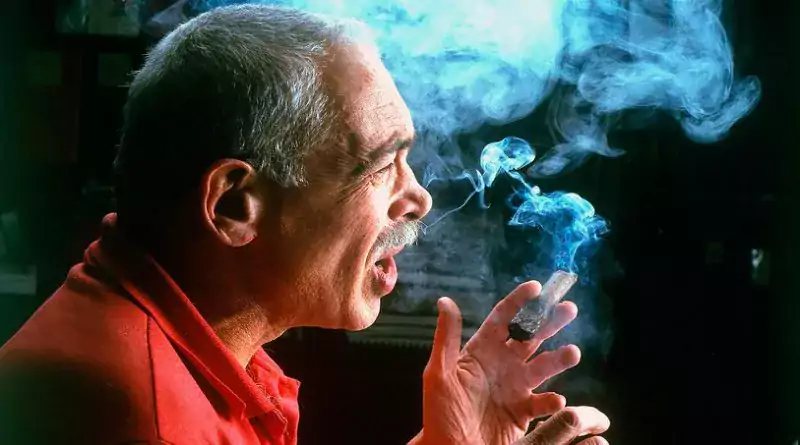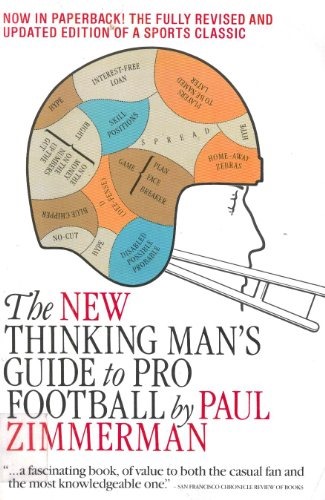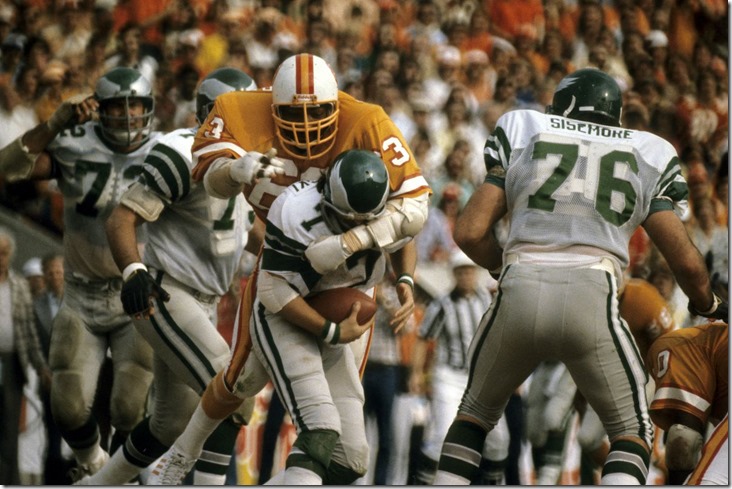
In Praise Of: The New Thinking Man's Guide To Pro Football

A series of things worth your time in the absence of sports.
Paul Zimmerman's, AKA Dr. Z, New Thinking Man's Guide To Pro Football is not the best book in history. Neither is it the worst named. But this space is willing to wager that it would place top ten in a good book : bad name ratio competition. Throw in the cover, which is a football helmet/brain divided into areas labeled with a jumble of football phrases ("player to be named later", "skill positions"), inanities ("D (DEE-FENSE)"), and non sequiturs ("interest-free loan," "no-cut")…
…and we are rapidly approaching a world record for most disservice done by a publisher to an author.
In any case, the NTMGTPF is a 1984 book that is a modernized version of the original 1971 edition that goes over football position-by-position, from the quarterbacks to the linebackers to the special teams lunatics to the officials and press. I do not read sports books I do not have to for the same reason dentists don't hop into bed and start poking at their spouse's teeth, but when I picked up NTMGTPF I quickly found out it was something different.
I got into reading about sports in the mid-to-late 1990s, and writing about them a decade after that. One of the great early kerfuffles in the now-defunct Newspaper-Blog War Of The Aughts (losers: everyone) was newspapermen and women rattling on about bloggers in their underwear typing from mom's basement, and how they could never know the vital heartbeat of sports reporting that came only from being in a locker room.
[After THE JUMP: Vince Lombardi asks a delicate question, undelicately]
This seemed like horseshit to me. I still remember when we started posting press conference transcriptions on the site. Tim would type them up and post them. I'd read them. Over the next four days I'd click on a newspaper story with an odd feellng of deja vu. Then I realized that a great bulk of modern sportswriting was trickling out quotes from a single availability and hoping nobody noticed that there wasn't any there there. The quotes were the tiny shrimp in a one-star Chinese restaurant's fried rice.
Some time later we got some real capital-A access. Heiko annoyed Al Borges into a long sit-down, and Adam got a series of brief one-on-one interviews he used to ask about specific plays. That remains some of the best content that's been on the site, but even then it felt like part of the media apparatus. Interesting, but sanitized. I still didn't really get why the oldheads put so much stock into talking instead of figuring stuff out.
Now I get it. They were romanticizing a time in the past when you could figure a lot of stuff out by talking, and get some eye-popping quotes besides. The NTMGTPF is so full of boggling quotes that when you close the book they fall on the floor. To demonstrate I have created this game: Random.org gives me three page numbers, and I post the most stupefying quote within one page of that number. Here we go.
Lee Roy Selmon was the first pick of the 1976 draft and was a six-time pro-bowler; he died aged 56 in 2011
Page 134:
"At halftime I told the coach my deepest secrets. I said I never wanted to be buried at sea. I never wanted to get hit in the mouth with a hockey puck. And I didn't want to go out and play the second half against Lee Roy Selmon."
--Ted Albrecht
Chicago Bears Tackle
Page 324:
"I just bumped him," Beverly said.
"Bumped him?" a league official said. "You might as well have hit him with an axe. He was out a minute."
"That's what we call bumping."
(Beverly suffered a 100 dollar fine.)
Page 242:
Marvin Fleming, the tight end, was only 21 when he joined the Packers. He tells a story about sitting by his locker one day and Lombardi kept passing him by and staring at him.
"Finally," he says, "coach Lombardi came over to me and said, 'Marvin, your eyes look dull. Have you been abusing yourself?'"
NTMGTPF—I told you about the name—brings forth a vibrant, devil-may-care vision of a professional locker room where everyone is laser-focused on their craft and isn't particularly worried about the opinion of anyone outside of their teammates and their rivals. To read it is to feel simultaneously delighted that it exists and despairing that nothing like it will ever happen again. Public relations has not yet extended its tentacles to sports in 1983.
It is also fascinating in the ways that football, and writing about football, has changed. Or, in many cases, hasn't. Or has and hasn't at the same time. Z constantly refers to the modern 1983 game as a "spread game" and a "speed game" since teams are throwing more, and using more little guys, and… uh… playing with two tight ends.
Meanwhile Dr. Z spends a paragraph or four in every chapter in which is it at all relevant complaining about a rule change unfathomable to modern ears. In 1978, the NFL let offensive linemen fully extend their arms. Imagining chicken-winged OL try to block the Brandon Grahams and Chase Winoviches of the world seems like asking a guy with a baseball bat to stop Cthulhu… and telling him he can't swing the bat. Nonetheless Z crabs about how every OL is 6'7" and now they have to lift weights so they can get up to 270.
Zimmerman does not shy away from addressing the brutality of the game, which the first chapter addresses at length. Today we wonder about the costs; Zimmerman, and most of the people he quotes, are more sanguine about the damage football inevitably causes. Still, the first chapter becomes increasingly melancholy. It finishes with this:
"For 13 years I lived a fantasy, full of live and dreams-come-true, emotionally, physically, spiritually," former Ram defensive end Fred Dryer said when he was finally released. "You know, of course, that it isn't going to last. There's a part of you, way down deep inside, that's always uneasy about that. It all went by in a heartbeat."
That is the platform Dr. Z chose to lovingly detail the most violent game from. He was nothing if not an honest man. Read his book.
Book cover and content eriely similar to mgoblog banner and content.
I miss Dr. Z.
I miss Dr. Z so much I had to post it twice. (Damn it.)
I read the 1971 version as a ten year old. My parents assumed that a football book couldn't be a bad idea. How wrong they were...thanks for sharing this Brian, and RIP Dr. Z
I miss Dr. Z and his columns. Spent so many Monday afternoons reading those columns early 'aughts. Somehow he wasn't convinced about Brian Urlacher's greatness "as presented by the press at that time".
one of my favorite books of all time, a book that i suddenly realize has gotten misplaced over the years.
...took me only a moment to remedy that, though. thanks, amazon.
Brian always reminded me of Dr. Z because Dr. Z was the only sports writer I'd ever read who charted every game to find the players with hidden value as well as identifying the overrated ones.
He also had this very specific way of watching the game, where you focus you eyes at the center and guards at the snap of the ball and gradually let your eyes move to the tackles/tight ends, and usually don't even look at the QB or RB until after the handoff or play action if at all. I've literally been doing it this way ever since and it totally changed the way I appreciate the game.
I didn't realize how much I missed the sports figures of my youth, so thank you for that, Brian. Baseball and Boxing used to be fountainheads of the odd mixture of cliche and frankness, like football. All things pass, and as sports talked more and more, saying less and less, I matched it with growing cynicism. I would have to say that Hockey was the last sport to succumb to PR's vat of oiliness.
Dr. Z was my favorite sports writers — until MGoBlog, of course. (Do I get extra points for sucking up?)
He had a remarkable combination of detailed description, clarity, and irreverence. And references to his personal life added spice, and didn't fall into the trap of being cloying.
When he made pronouncements, he clearly did it based on experience, and not simply because he had the column and knew he might get more clicks for being opinionated. (I'm looking at you, SI.com and East Lansing homers.) That's the writer's version of being in charge simply because you're in charge.
August 5th, 2020 at 11:00 PM ^
Dr. Z. was way ahead of his time and in many ways still is.
I didn't want to go out and play the second half against Lee Roy Selmon.
LEE ROOYYYY SELMONN!!!
I learned how important line play is by reading Dr. Z. To this day I still focus on the line of scrimmage and keep track of the ball peripherally, and it still startles me how well you can tell a play's success/failure two seconds in without following the ball, but instead focusing on the blocking/lack thereof.
August 6th, 2020 at 11:22 AM ^
I still have old habits of following the ball but looking at the line rewards the focus.


Comments